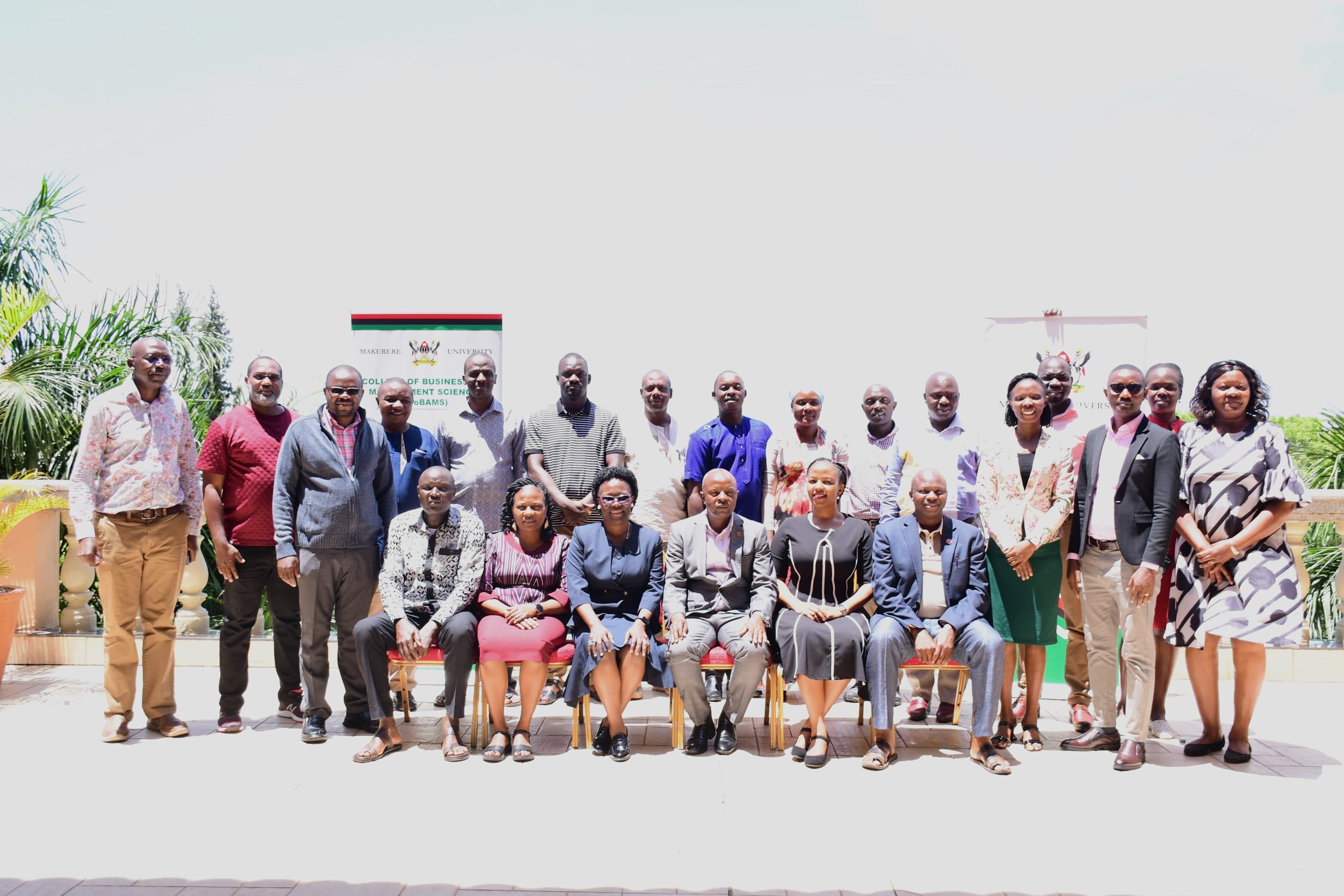Through its strategic plan, Makerere University commits to being a research driven institution. This presents the ten (10) colleges at Makerere University with a golden opportunity to tap into the vast knowledge and rich experience of its qualified and experienced staff to contribute to the realization of the University’s research agenda.
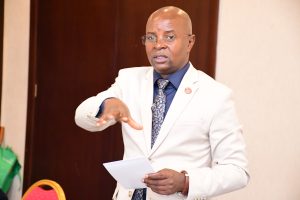
Consequently, the College of Business and Management Sciences (CoBAMS) led by the Principal, Prof. Edward Bbaale organized a two-day strategic planning retreat bringing on board a representative sample of staff classified as the College management team to critically discuss the research direction of the college and come up with strategies aligned to the Makerere University strategic plan.
The two-day strategic planning retreat (10th to 11th April 2025) involved highly interactive sessions with seasoned facilitators namely the Principal-Prof. Edward Bbaale, the Deputy Principal-Prof. James Wokadala, the Director of Graduate Training-Dr. Julius Kikooma, the Head of Grants Administration and Management Support Unit (GAMSU)-Prof. Sylvia A.N. Nannyonga-Tamusuza and the Director of Quality Assurance-Dr. Cyprian Misinde. It was moderated by Ms. Ritah Namisango and Mr. Peter Mubiru, who are members of the CoBAMS management team.
The presentations featured the College Strategic direction, the College Quality Assurance Framework, the Strategic direction of Makerere University on graduate training, Grants Management and harnessing the power of the College and members of staff to attract and win grants. In addition, the retreat provided a forum to discuss other critical functions such as innovative teaching and learning, internationalization, community engagements, knowledge transfer partnerships and networking.
Welcoming the participants, Prof. Edward Bbaale emphasized that the strategic planning retreat provided a pivotal platform to shape the future of the college. He stated that as Makerere University implements its research-driven agenda, CoBAMS will play a central role through prioritization of research and graduate training, internationalization, and provision of innovative teaching and learning.
He informed the College management team to embrace an approach that positions the students at the centre of research and the various activities undertaken by the College.
“The best way to propel CoBAMS is by working with students. A student with a good Masters’ degree dissertation should be supported through mentorship to publish his or her work,” he said.
Strategic and research direction of the College
Prof. Bbaale guided that every member of faculty should focus on increasing graduate student enrolment and knowledge production. Referring to well researched data, Prof. Bbaale reported that graduate students account for only 12% of the enrollment. He noted that the goal was to ensure that graduate students constitute 30% of the total enrollment by 2030. He rallied members of staff to work together to increase the number of graduate students both at Masters’ and PhD levels. He implored staff to effectively supervise graduate students so that they complete on time. He encouraged staff to involve graduate students in research projects, grant writing and joint publications. He noted the need to profile and follow up the graduate students.
Convinced about the strong correlation between research output and the number of PhDs, Prof. Bbaale urged staff to increase the number of PhD students. For instance, the taught PhDs in Economics, Finance, and in Statistics will significantly contribute to increased enrollment,” he said.
“Central to this is stabilizing graduate output and ensuring consistent PhD supervision. The structured PhD by research program and the taught PhDs if managed well will significantly increase the number of graduate student enrollment,” he added.
In this regard, Prof. Bbaale congratulated the Units under the College of Business and Management Sciences namely the School of Business, the School of Economics, and the School of Statistics and Planning for coming up with the option of taught PhDs.
Prof. Edward Bbaale makes his presentation. College of Business and Management Sciences (CoBAMS), Makerere University, Kampala Uganda, East Africa led by the Principal, Prof. Edward Bbaale two-day strategic planning retreat for College management team to critically discuss the research direction of the college and come up with strategies aligned to the Makerere University strategic plan, 10th-11th April 2025.
On the issue of timely completion of graduate programmes, he advised the faculty members to ensure that the students present vivas in January, February or March.
In addition, the crucial role of graduate coordinators and the college doctoral forum, convened by Dr. Kassim Sendawula, in nurturing a sense of community and providing support for Ph.D. students was emphasized.
Providing direction on research centres, he demystified the concept of thinking that one requires a physical building or large space to come up with a research centre. Prof. Bbaale encouraged faculty members to network and form research centres. “A centre is a team of researchers with like minds, passion and expertise in a particular area/field. For instance, Members of staff in the College of Business and Management Sciences could establish a Centre of Excellence in Tax Advisory.”
He explained the need to translate research into products that can be sold. He commended the ongoing initiatives by the College such as the Entrepreneurship Congress, and the Makerere University Innovation Pod. He called upon staff in CoBAMS to work with the Makerere University Innovation Pod, which is headed by a faculty Member-Dr. Cathy Mbidde.
On the issue of internationalization, the Principal called for more collaborations with internationally recognized and reputable universities, bodies and research centres. He advised staff to actively participate in Erasmus mobility programmes and to implement collaborations that provide for staff and student exchange programmes.
In addition to acquiring degree qualifications from Makerere University, he advised the teaching staff to take a bold step and attain academic qualifications from internationally recognized institutions in other countries/continents.
“As a member of faculty, if your undergraduate degree or Masters’ was awarded by Makerere University, it is important that you secure your PhD from another internationally recognized university. This presents you with a rich and wider perspective as an academic, distinct advantage, exposure and access to other networks,” he guided.
Tackling the financial sustainability of the College, the Principal explained the need to establish special programs to operate as projects for example short courses leveraging the Council’s sharing ratio of 20:80, lobbying the University Management for more funding, mobilizing the college alumni, growing the College Endowment Fund, enhancing grant writing through GAMSU support and strengthening the College’s IRB.
Quality Assurance in teaching and learning processes
In his presentation, Dr. Cyprian Misinde focused on the standards and guidelines that should be followed by staff to safeguard the quality of processes at Makerere University.
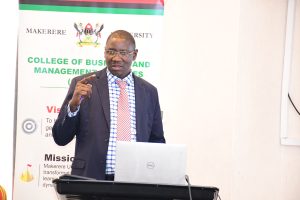
Dr. Misinde re-affirmed the need for the CoBAMS teaching staff to scale up their research potential and outputs, actively participate in capacity building programmes, and above all, to continue to publish their research or work in internationally recognized journals.
He articulated the need to uphold the provision of high quality academic programmes through curriculum reviews, peer reviews, involvement of the private sector and industry, and following national and international accreditation procedures.
Dr. Misinde equally stressed the need for academic staff and heads of the respective departments to understand the accreditation steps and requirements and strictly adhere to the procedures. This, he added, will enable the Schools and Colleges to submit the academic programmes for accreditation to the Academic Registrar, Directorate of Quality Assurance and the University Senate within the expected timelines.
To enhance the effectiveness of instruction, he encouraged the teaching staff to adhere to fulfilling the minimum teaching load as per the University policy, reinforcing the commitment to delivering quality education.
On the management of students’ results, Dr. Misinde appealed to the teaching staff to mark the students’ scripts within the stipulated timeline. He reminded the teaching staff to adhere to the centralized marking processes at the College or School levels. He advised the College leadership to always invite the Student leaders or representatives to witness the centralized marking processes in order to build trust and transparency at all levels.
He informed participants about the independent student-staff assessment/evaluation tools that are administered by the Quality Assurance Directorate. These, Dr. Misinde clarified, present an opportunity to the students to assess their respective teachers/lecturers. He stated that these evaluations are essential for fostering educational quality and enriching the overall student experience. He disclosed that the feedback gathered from these assessments not only informs curriculum development but also identifies areas that require improvement in teaching methodologies, aligning with the university’s strategic objectives.
Graduate training at Makerere University
Building on the call to action by Prof. Edward Bbaale to the teaching staff to actively participate in critical processes aimed at increasing the number of graduate students, Dr. Julius Kikooma’s presentation centred on sensitizing staff on their obligations in the realization of that dream.
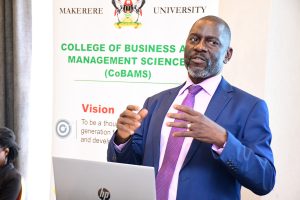
He outlined the Makerere University graduate policies, framework for structured PhD by research, graduate supervision and mentorship, digitization of the graduate training processes through the Digital Research Information Management System (RIMS), strengthening the capacity and commitment of human resources to drive the research-led agenda, elements of the Makerere University Graduate research strategy, teaching of PhD cross cutting courses, among other key factors.
Dr. Kikooma called upon Deans, Heads of Departments, Supervisors of Graduate Progammes and Registrars at CoBAMS to participate in the training on RIMS scheduled to take place on 21st April 2025.
Grants Administration and Management at Makerere University
In her presentation, Prof. Sylvia A. N. Nannyonga-Tamusuza reported that funds received through grants significantly contribute to building the research profile of the University, calling upon, Colleges to implement strategies aimed at attracting and winning research grants at the national and global levels.
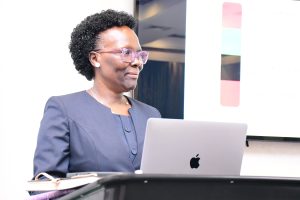
She explained the need to professionally manage the research grants, requesting those entrusted to adhere to the terms and conditions specified in the guidelines or contract.
She observed that whereas it is mandatory to close out a grant/project, some entities do not, which is a great omission. She urged the faculty members and researchers to follow the guidelines stipulated during the grant application and award processes.
Prof. Sylvia A.N. Nannyonga-Tamusuza. College of Business and Management Sciences (CoBAMS), Makerere University, Kampala Uganda, East Africa led by the Principal, Prof. Edward Bbaale two-day strategic planning retreat for College management team to critically discuss the research direction of the college and come up with strategies aligned to the Makerere University strategic plan, 10th-11th April 2025.
The Head of GAMSU emphasized the need to form research teams. “We have different abilities and skills. Through teams, we leverage our strengths. It also encompasses the multi-disciplinary approach,” she said. Underscoring the role of negotiation and interpersonal relations, she recommended training of researchers to engage with international partners.
She re-affirmed the necessity for proper documentation, transparency and accountability for funds. She reminded Principal Investigators, researchers and staff in general that research grant money is received on behalf of the institution, and not individuals. Thus, GAMSU expects to receive quarterly reports on grants. She explained that whereas some units could have designated a researcher or a member of staff to manage grants, when following up reporting and accountability for such funds, GAMSU engages the College Principal and College Bursar/Accountant.
To continue onboarding staff on grant administration and management, Prof. Nannyonga-Tamusuza revealed that GAMSU would conduct an intensive three (3) day training for Accountants, Research Assistants and Staff who handle grants at the University.
Way Forward
The College leadership team was tasked to lobby management to have an institutionalized mechanism for staff who mobilise resources for the University.
The College leadership team would schedule a specialized meeting with the University’s central management pertaining to research, funding, grant writing and execution, and graduate training among others.
Noting that members of staff play a vital role in the success of the college, the participants recommended prioritization of staff welfare focusing on health, sports, and morale.
Touched by the active participation and articulation of critical issues, the Principal committed to work with the College management team to ensure that the retreat bringing on board the College Management team is held twice a year.
Closing remarks
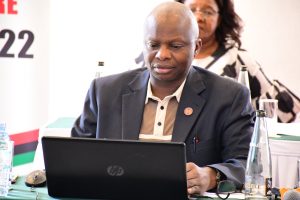
Prof. Wokadala commended the College management team members for participating in the retreat. “The retreat is one of the vehicles of creating a bond as the College management team. I am glad that we have discussed a number of critical issues that align with the strategic direction of the University,” said the Deputy Principal.
Prof. Bbaale thanked the organizing team and participants, urging them to reflect on the discussions and implement agreed-upon actions to improve the college for the benefit of its stakeholders, including students and the broader community. He also pointed out the need for the next retreat to focus on aligning the College’s strategy with the National Development Plan 4 (NDP4), ensuring its relevance and contribution to national development goals.

